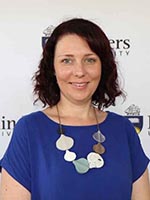The Perfect Finish: Having Confident End-of-Life Conversations
A blog co-written by Dr Pippa Collins and Dr Olivia Farrer
When UK-based physiotherapist and End-of-Life Advanced Clinical Practitioner Pippa Collins spoke at the Global Allied Health Academy, she invited us to look differently at frailty and dying. Her session, Reimagining Frailty: Advanced Practice at the Edge of Complexity, she posed the question:
Is the World Health Organization’s definition of palliative care too grounded in a medical model?
Pippa suggested that by clinging too tightly to a medical lens, we risk treating dying of frailty or older age as a medical problem to be solved, rather than a natural event in a person’s life story. In doing so, we can lose sight of what really matters to people in their last months and weeks. We also risk creating a healthcare crisis where a “cure” is sought, rather than a recognition of the uncertain process of dying.
One story she shared stays with you long after you hear it. Pippa was visiting an older gentleman who had become unwell. He was cared for in bed and had had a recent long hospitalisation. It was clear that he wasn’t interested in talking about his health that day. She asked what was on his mind. His worries had less to do with his health and everything to do with how he would keep caring for his beloved cat. As his frailty had increased he had increasing numbers of outpatient appointments meaning that the only times he left the house were to go to the hospital. Visits that he found exhausting.
When she asked if he’d like to consider skipping some of those appointments, he looked at her and said, almost in disbelief, “Am I allowed to do that?”
It’s a powerful reminder that, in our drive to meet health goals, we can forget to offer older people permission to opt out. To choose what matters most. To say, “I’ve had enough tests,” or “I’d rather stay home with my cats".
Of course, these conversations assume that it has been acknowledged and accepted that the person is living through the last stage of their life. And for a practitioner, it means being confident enough to create space for honesty about what health care can, and cannot add to a person’s wellbeing. This pivots on care plans and conversations that accommodate and support the older person’s wishes.
Yet, as simple as this may sound, it’s not always easy to do in practice. A national survey led by Professor Jennifer Tieman and colleagues showed that many allied health professionals don’t feel confident talking about death and dying. Even though these conversations are vital, clinicians often worry they will say the wrong thing or take away a person’s hope. Building these skills takes time, reflection, and support. It’s not only about learning the right words, it’s about learning to sit with discomfort and to trust that being present and honest is often what people want most.
For Pippa, this confidence is at the heart of advanced practice at end of life. It’s about being able to talk plainly but gently about dying and what the future may hold, without shying away or wrapping it in euphemisms. Its about understanding what the person wants and enabling them to achieve this.
In a separate conversation during Dying Matters Awareness Week in the UK, Pippa decided to ask her own parents who are in their 90’s how they’d feel if a health professional was frank with them about death.
Here’s how that exchange went:
Mum: Wouldn’t mind.
Dad: Wouldn’t mind at all.
Pippa: What sort of language should they use?
Mum: English! They don’t have to be careful. Everybody’s going to die. The sooner we get our minds around it, the better.
Pippa: Being direct - is that acceptable?
Mum: Yes, it is to us. Surely for most people. We’ve all got to die.
Dad: We had a guest priest in our church some years ago. He’d been asked to speak about death and the afterlife. He was driving around wondering what on earth he would say. He stopped at a filling station, and there was a big banner by the car wash. It read: For the perfect finish. And that’s what he preached about. Isn’t that lovely?”
For all of us working alongside older people, these stories are an invitation to reflect: Are we brave enough to have these honest conversations? Do we give people permission to prioritise what matters to them, to have their perfect finish, even when that means stepping back from the traditional model of medical care?
If you’re not sure where to start, remember you don’t have to be an expert to listen and respond with compassion. Resources, training, and mentoring are available to help build confidence in these essential conversations. And perhaps more importantly, talking openly with colleagues about your own worries can help normalise the fact that no one finds these discussions easy.
But in the end, supporting someone to have their version of “the perfect finish” may be the most person-centred care of all.
For more information, the ELDAC Allied Health Toolkit offers advice on key principles and links to professional development in Having Confident End Of Life Conversations – Hot Topic.
Further engagement with Pippa’s work:
Minds in Motion podcast, Dr Pippa Collins shares her journey from physiotherapy to pioneering research in frailty, dementia, and end-of-life care. Joined by hosts Dr Katie Breheny and Trevor Salomon, Pippa discusses the urgent need to rethink palliative models, the value of compassion in clinical practice, and how lived experience and research can work hand-in-hand to improve care.

Dr Pippa Collins, Advanced Clinical Practitioner and Post Doctoral Research Fellow
Dorset Healthcare University NHS Foundation Trust & ARC Wessex, UK.

Dr Olivia Farrer, Accredited Practicing Dietitian, Senior Research Fellow
ELDAC Allied Health Toolkit.